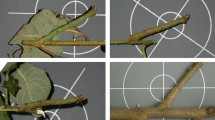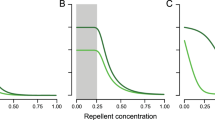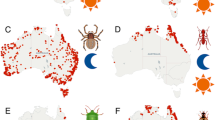Abstract
SELECTIVE control of pest insects by behaviour-controlling scents or other metarchons1 promises to become a preferred method, but if, as seems probable, the scents to which insects respond are in most cases blends of several distinct chemical substances, the problem of isolating and identifying the active materials becomes very difficult2. This control method is based on the assumption that by sufficiently permeating the environment with a particular scent, such as a sex attractant, either the males will be unable to perceive the small increment released by the female or, what is effectively the same thing, their receptors will become fatigued and temporarily cease to register any signal.
This is a preview of subscription content, access via your institution
Access options
Subscribe to this journal
Receive 51 print issues and online access
$199.00 per year
only $3.90 per issue
Buy this article
- Purchase on Springer Link
- Instant access to full article PDF
Prices may be subject to local taxes which are calculated during checkout
Similar content being viewed by others
References
Wright, R. H., Nature, 204, 603 (1964).
Wright, R. H., Nature, 204, 121 (1964).
Kellogg, F. E., and Wright, R. H., Canad. Ent., 94, 486 (1962).
Author information
Authors and Affiliations
Rights and permissions
About this article
Cite this article
WRIGHT, R. Finding Metarchons for Pest Control. Nature 207, 103–104 (1965). https://doi.org/10.1038/207103a0
Issue Date:
DOI: https://doi.org/10.1038/207103a0
This article is cited by
-
10.1007/BF00335886
CrossRef Listing of Deleted DOIs (2011)
-
Potential uses of kairomones for behavioral manipulation ofCotesia marginiventris (Cresson)
Journal of Chemical Ecology (1984)
Comments
By submitting a comment you agree to abide by our Terms and Community Guidelines. If you find something abusive or that does not comply with our terms or guidelines please flag it as inappropriate.



